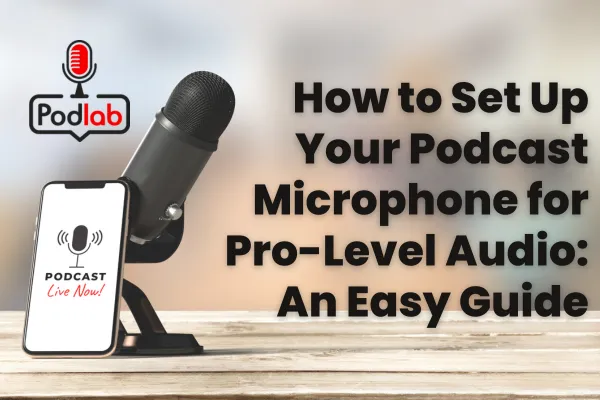PodLab Blog Posts

How to Set Up Your Microphone for Pro-Level Audio: An Easy Guide
How to Set Up Your Podcast Microphones for Pro-Level Audio: An Easy Guide
When it comes to launching a podcast, audio quality is very important. Listeners may forgive the occasional stumble or ramble, but poor sound quality is a dealbreaker. Imagine investing hours into crafting great content, only for it to fall flat because of subpar audio. Don’t worry, though! You don’t need to break the bank to achieve high-quality audio. With the right podcast equipment setup guide and some quick & smart adjustments, you can create a setup that makes you sound like a pro.
Based on my experience as a podcast producer and strategist, here’s everything you need to know about getting the most from your microphone and setting yourself up for audio success. Let’s get started!
1. Choose the Right Microphone: Go Dynamic
One of the biggest questions new podcasters ask is, “What’s the best podcast microphone setup for a great sound?” I recommend dynamic microphones for most podcasters, as they are more forgiving and do a solid job of rejecting background noise. This feature is essential when recording in a non-studio setting.
If you’re looking for a top choice, the Shure MV7+ is my favorite recommendation for a podcast microphone. It’s a trusted workhorse because it captures voices beautifully without requiring a soundproof room. If you’re after a more affordable podcast microphone, consider the Audio-Technica ATR2100x. It’s dynamic, USB-compatible, and fantastic for podcasters on a budget.
2. Master Your Mic Positioning
After selecting the right microphone setup for beginners, how you place it is crucial. The right placement makes a significant difference in audio quality, especially when trying to capture a clear, rich voice without distortions or background noise. Ideally, keep the mic around 6–8 inches from your mouth, angled slightly to avoid harsh sounds known as plosives—those unwanted bursts of air that occur with words like "p" and "b."
Experiment with positioning to see what works best for your microphone. Move it around a bit, record test clips, and listen back. This step will ensure you find the “sweet spot” that gives your voice a warm, full sound.
3. Add a Pop Filter or Windscreen
For a professional podcasting setup, using a pop filter or windscreen is a must. A pop filter is a small mesh screen that sits in front of your microphone and helps reduce plosive sounds, giving your voice a smoother tone. This inexpensive addition will enhance your audio quality and prevent recordings from sounding amateurish.
If you prefer, a foam windscreen that fits over the microphone also works well. Both options are great for refining your podcasting positioning and adding a layer of polish to your sound.
4. Stabilize Your Setup with a Boom Arm
One of the most common mistakes I see among beginners is placing the microphone directly on their desk, which can cause issues. Desk vibrations—whether from typing, shuffling papers, or even moving your chair—travel through the microphone, creating a low-frequency rumble that disrupts your recording.
Instead, use a boom arm or microphone stand to keep your podcast microphone stable and isolated from desk movements. A boom arm allows you to easily adjust the microphone’s position without touching it, which is a small investment that pays off significantly in sound quality.
5. Control Your Recording Environment
No microphone, no matter how good, can completely eliminate background noise. But you can improve your environment to achieve the best podcast microphone setup. Start by removing as much background noise as possible: close windows, turn off fans, and consider sending the pets out of the room.
For better sound absorption, add soft materials like curtains, rugs, and pillows to your space. They help reduce echo, creating a cleaner, more professional sound for your recordings. If you’re looking for extra improvement, consider acoustic foam panels. They’re affordable and make a big difference in the audio quality of your podcast. Plus, they look cool!
6. Edit Like a Pro
Even with a great podcasting audio setup checklist, a little editing can enhance the final product. Consider these techniques to polish your recordings:
Noise reduction: Most editing software, like Audacity, Adobe Audition, or GarageBand, includes noise reduction tools. Use these tools to remove low-level background sounds.
Compression: This evens out your volume levels, so your voice sounds consistent across the episode. It’s particularly helpful if you tend to shift between soft and loud speaking tones.
EQ (equalization): Adjusting the bass, mid, and treble frequencies can add richness to your voice and make your microphone setup for beginners sound like a seasoned pro’s.
7. Always Run a Sound Check
Before diving into each episode, take a few minutes to run a sound check. This simple practice will ensure that your microphone setup and levels are on point, preventing potential issues from sneaking into your recordings. Speak into the microphone at your usual volume, listen back, and make sure there’s no distortion, clipping, or unexpected background noise. Solving these issues upfront will save time in editing and produce cleaner audio overall.
Final Thoughts: Embrace the Journey of Podcasting
Creating a podcast microphone setup that sounds professional isn’t about having the fanciest gear or studio environment. With a microphone that matches your needs, smart positioning, and a few basic tweaks to your recording space, you can get excellent results without breaking the bank. Remember, podcasting is a journey—take it step by step. Improve one part of your setup at a time, and you’ll notice huge gains over time.
And if you’re ready to dive deeper or refine your setup further, reach out to a podcast producer. We can take a lot of the guesswork out of fine-tuning your podcast microphone recommendations and ensure that your show is heard exactly the way you intend.
Ready to elevate your business with a professional podcast? Whether you're just starting out or looking to take your podcast to the next level, PodLab can help you become a market leader and attract more clients. Book a FREE podcast consultation call with us today and let's discuss how we can make podcasting a powerful tool for your business. Click here to schedule your session now!
Happy podcasting!

Navigation
Contact Us
© 2023 All Rights Reserved
Podlab.agency

